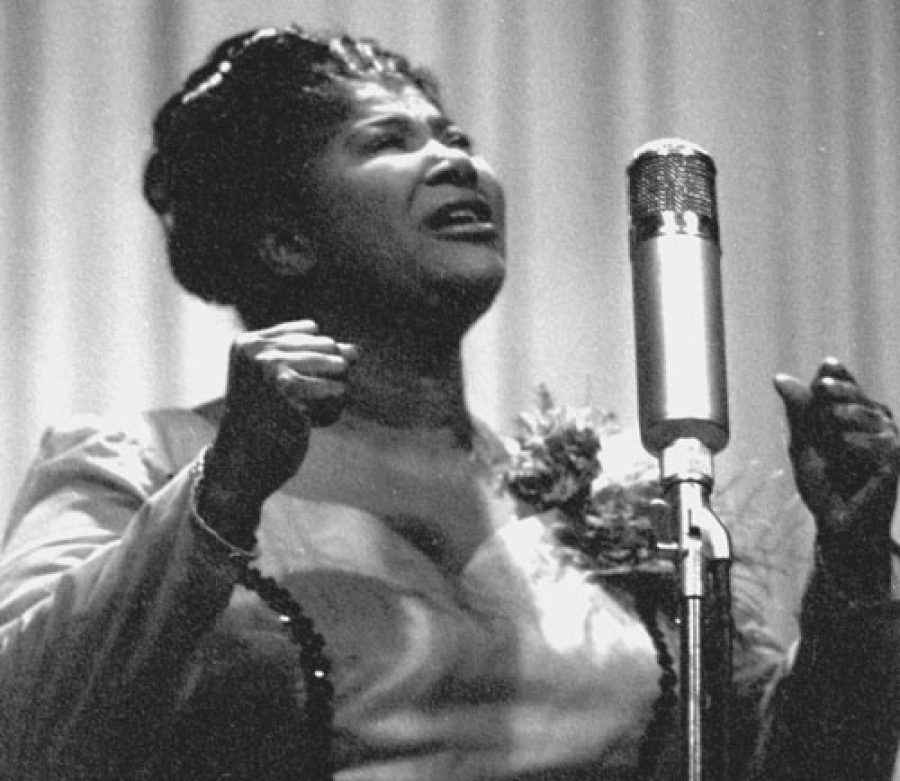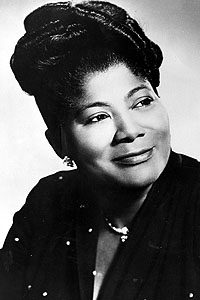Mahalia Jackson’s accomplishments and artistry ushered in the Golden Age of Gospel, lifting the genre from churches and revivals into mainstream American music, where it remains in present time.
The very beginnning...
Born on October 26th, 1911 in New Orleans, Louisiana, Ms. Mahalia Jackson was heavily influenced by many factors that lead to her success and artistry as a gospel singer. Musical composer, Thomas Dorsey, jazz singer, Bessie Smith, and, most of all, her mother, Charity Jackson, were the most prominent figures that influenced her music. In an interview, Jackson mentioned that “all of the goodness in her music” was influenced by her mother, continuing the goodness and love that was given to her and sharing it with the masses. After the death of her mother, Jackson moved in with her Aunt “Duke” in Carrollton Section New Orleans. Aunt Duke maintained a very strict, religious household limiting the amount of secular music to zero. However, blues, traditional New Orleans swing style jazz, as well as religious spirituals influenced the sound of Mahalia Jackson.

After her stay with her Aunt Duke, Jackson was soon swept up by the Great Migration North with many other African Americans in the South in search for better opportunities, and better opportunity was found for Ms. Mahalia Jackson upon her arrival in Chicago. When Jackson arrived in Chicago at age sixteen, she quickly found her way into a singing group out of Great Salem Baptist Church called The Johnson Brothers. Eventually, the group went on a tour of the Midwest primarily performing in churches and Black audiences. The crowds that Ms. Mahalia performed for were left astonished by her identifiable emotional and southern voice. Despite many “professionals” critic of her voice, saying that it was not enough for White people to understand, Ms. Mahalia Jaclson stayed true to her voice and integrity.
Church to Mainstream
Mahalia Jackson’s voice began to attract many crowds and media, and in 1937 she started recording with Decca records. In the early 1940s, she began to work with former blues musician turned Gospel icon Thomas A. Dorsey. However, Jackson’s breakout record, “Move On Up a Little Higher,” did not release until 1948 with Apollo records, and by the turn of the early 1950s, she became a major star in the music business among people of all races.
“Move On Up a Little Higher” quickly advanced to being a spectacular success, with no other gospel song achieving the number of record sales in the secular world. Across the nation, stores had difficulty maintaining the supply for the demand of listeners that wanted Mahalia Jackson’s first and most significant hit. Mahalia Jackson quickly became an international star performing worldwide, from singing on radio in France, Germany, and Denmark to performing on CBS radio and the Ed Sullivan show in 1956. Jackson also performed for European royalty, such as Royal Albert Hall, as well as for President Eisenhower and the inauguration of John F. Kennedy.
Despite Jackson’s continuing success with her gospel music, she faced much scrutiny from the religious community. With her frequent touring in Europe and singing with secular artists, many criticized her feeling that she had abandoned the gospel and church community for the secular world. However, she ignored the critics remaining a prominent figure on television and other media in her attempt to spread the gospel to the masses, making the message more inclusive. Mahalia Jackson made many appearances on the Ed Sullivan show and other leading television programs hosted by the Studs Terkel, Nat “King” Cole, and Dinah Shore.
The Voice of the Civil Rights Movement
Now coined the “Queen of Gospel,” Mahalia Jackson os starting to perform at sold out venues such as Carnegie Hall 1956 in New York City. While in New York City, she attended the National Baptist Convention, where she first made her introduction to Dr. Martin Luther King Jr. After their meeting, Dr. King began to rely on Jackson to be present for many of the boycotts and protests being held all other the South such as the Montgomery Bus Boycott, the Brown v. Board of Education ruling, the Prayer Pilgrimage for Freedom, and the Southern Christian Leadership Conference fundraisers. Not only was Jackson present for all events, she also served as a spiritual advisor for Dr. King whenever he felt uneasy about the journey ahead he would call on Ms. jackson to sing into him the power he needed to keep fighting for equality and equity for all people.
As a granddaughter of enslaved persons, Jackson was emotionally and financially committed to the Civil Rights Movement. When choosing a performer for the March on Washington, Dr. King chose the only person he knew who could express the event’s gravity, Mahalia Jackson. However, singing for the event was not the only way Ms. Jackson assisted Dr. King; she also sparked his infamous “I Have a Dream” speech which was not originally in his draft. Jackson knew the address needed to be said to millions of people to spark inspiration, and people are forever grateful for hearing the dream that helped get them where they are now.
Ms. Jackson placed her career and faith on the front line for a cause that she knew was more significant than her, and they both prevailed. By investing in more than one way, Mahalia Jackson became the voice of a powerful movement that will be remembered for years.
Her Legacy
The National Academy of Recording Arts and Sciences crated a Gospel category for Mahalia Jackson, making her the first Gospel artist to receive a Grammy Award. In 1997, 25 years after her death, Mahalia Jackson was inducted into the Rock and Roll hall of fame, proving that a person cannot imagine the progress of contemporary music without the influence of Mahlaia Jackson. Mahalia Jackson will forever be remembered for her powerful, resonating, and unconventionally soulful gospel music. She will also be remembered for her fight for visibility for African Americans and the gospel genre.
References
https://www.biography.com/news/mahalia-jackson-i-have-a-dream-influence
https://www.npr.org/templates/story/story.php?storyId=123498527
https://www.biography.com/musician/mahalia-jackson
https://kinginstitute.stanford.edu/encyclopedia/jackson-mahalia
https://www.theguardian.com/music/2022/may/19/mahalia-jackson-martin-luther-king-al-sharpton
THE RELIGION CORNER: Mahalia Jackson — A Lifetime Story


